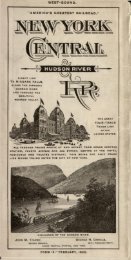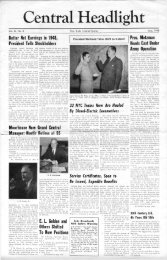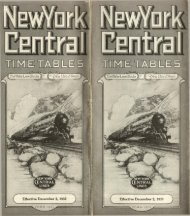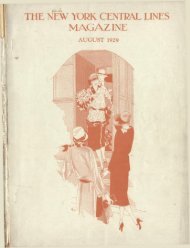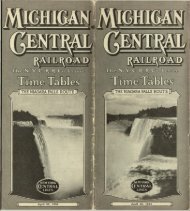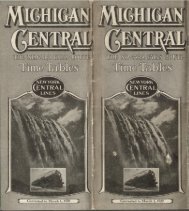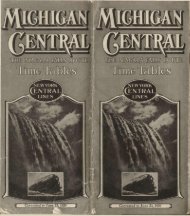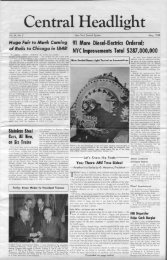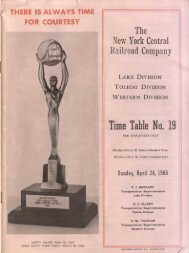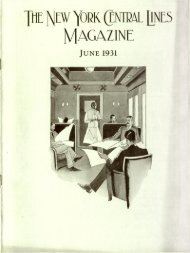You also want an ePaper? Increase the reach of your titles
YUMPU automatically turns print PDFs into web optimized ePapers that Google loves.
2b New York Central Lines Magazine for May, 192H<br />
on quantities of food and food balancing.<br />
Almost everyone has heard the<br />
word calorie used in connection with<br />
foods and diets, and those who have<br />
studied physics know that a calorie is<br />
a unit indicating the quantity of heat<br />
necessary to raise a fixed quantity of<br />
water one degree Centigrade. In dietetics<br />
a calorie means the same thing<br />
and it is a unit used to measure the<br />
value of foods as heat and energy producers.<br />
Out of this rather complex study<br />
has come a knowledge of the number<br />
of calories expended daily by different<br />
individuals engaged in different occupations.<br />
And by the same token, the<br />
number of food calories necessary per<br />
day for each individual is known.<br />
With the calorie value per ounce of<br />
food in our possession it is quite simple<br />
to estimate the quantity of food<br />
necessary. And by knowing the chemical<br />
value of foods per calorie it is<br />
also a simple matter to estimate the<br />
quantity of each kind of food; in<br />
other words, it is relatively easy to<br />
work out a balanced diet. And a balanced<br />
diet is one that supplies the<br />
various chemical substances of foodstuffs<br />
in the quantities necessary for<br />
maintaining the body in a normal<br />
state of being.<br />
2,500 Calories a Day<br />
It has been found that an adult person<br />
engaged in ordinary light occupations<br />
such as-the duties of professional<br />
men, salesmen and housekeeping, requires<br />
approximately 2,500 calories of<br />
food a day. For those who do hard<br />
manual labor 3,500 to 4,000 calories<br />
are required. In the young it has<br />
been found that children up to one<br />
year old require about 1,000 calories;<br />
children from one to four years old<br />
require about 1,500 calories; children<br />
from four to ten years old require<br />
from 1,500 to 2,500 calories and children<br />
in the years of adolescence require<br />
up to 6,000 calories.<br />
Obviously there are factors involved<br />
that cause variations in the food requirements<br />
of people in general. Some<br />
of these factors are age, sex, temperature<br />
of environments and individual<br />
characteristics. Thus athletic<br />
youths require 4,000 to 6,000 calories<br />
while persons seventy or eighty years<br />
old require only 2,000 calories. Females,<br />
in general, require less food<br />
than males. (But that does not mean<br />
that young women are to starve themselves.)<br />
During cold weather the<br />
caloric food requirements are higher<br />
than in warm weather. Thus it requires<br />
some 8,000 calories for a man<br />
to live and maintain normal body conditions<br />
in the Arctic regions.<br />
With regard to balancing a diet,<br />
such is quite possible. In fact, a<br />
scientifically balanced diet can be<br />
worked out, but in every-day practice<br />
absolute accuracy is not so essential.<br />
In the main the points of importance<br />
are concerned with the quantity of<br />
protein consumed and the quantity of<br />
carbohydrates and fats. For the man<br />
who requires a total daily intake of<br />
2,500 calories of food, 400 to 500<br />
calories of protein are sufficient. To<br />
balance properly the carbohydrate and<br />
the fat intake this same person should<br />
eat a carbohydrate caloric value of<br />
1,200 and a fat caloric value of 900.<br />
Reduced to common weights the intake<br />
would be something as follows:<br />
Protein intake, four ounces; carbohydrate<br />
intake, one hundred ounces; and<br />
fat intake, three ounces. By referring<br />
to any standard table of the food<br />
values of food in ounces the reader<br />
will gain an idea of how much to eat.<br />
But ordinarily this is not necessary if<br />
The Sugar Camp<br />
By Dan G. St owe<br />
Claim Department, Cleveland<br />
HEN breath of spring awakes<br />
W once more<br />
To life the sleeping trees,<br />
The maple's luscious sweets more<br />
rich<br />
Than stores of honey bees,<br />
Are filtered through their sap veins<br />
In drops of crystal blood;<br />
And yielded at the campfires,<br />
In the dark aisles of the wood.<br />
I loved to tend at night the fires,<br />
Within whose throbbing glow<br />
Were forged the happiest memories<br />
It's been my lot to know.<br />
Like bridal veils the fleecy clouds<br />
Of fragrant vapor rise;<br />
So soft, and white, like some sweet<br />
soul<br />
From out God's paradise.<br />
How quiet the night, except the<br />
breeze<br />
From some far southern clime;<br />
And tinkling drippings of the sap,<br />
Beating liquid time.<br />
Up in the sky's dark canopy<br />
The stars are shining bright<br />
And there seems a wondrous mystery<br />
In the shadows of the night.<br />
Awakened from my reveries<br />
I hear a joyful sound;<br />
Going to have some visitors,<br />
And I must hustle 'round.<br />
Eggs boiled in sap, some sandwiches,<br />
Home-made bread and ham,<br />
Warm syrup, heart-shaped sugar<br />
cakes,<br />
Marmalade, and jam.<br />
Open the fire-doors of the arch,<br />
Send up a starry shower;<br />
Let years of closest friendship be<br />
Concentered in this hour.<br />
True friendship's fires can not be<br />
quenched<br />
But in our hearts abide,<br />
And ripening with the years become<br />
Enriched and purified.<br />
Then gather 'round the campfire<br />
bright,<br />
Send up a starry shower,<br />
Old Father Time can ne'er efface<br />
The memories of this hour;<br />
And when dear friends are homeward<br />
bound<br />
Then I'll turn down the lamp,<br />
And in my slumbers live again<br />
The hours in the sugar camp.<br />
he will eat twice the amount of bulky<br />
food that he eats of the combined bulk<br />
of fats, starches, sugars and meats.<br />
As an example of a normal diet I will<br />
reproduce a single day's menu from<br />
Dr. W. D. Sansum's new book, "The<br />
Normal Diet," published by C. V.<br />
Mosby Company, St. Louis, Mo.<br />
BREAKFAST<br />
Grapefruit<br />
Shredded wheat with milk and sugar<br />
Scrambled eggs<br />
Toast and butter<br />
Coffee with cream and sugar<br />
DINNER<br />
Fresh fruit cocktail<br />
Chicken broth with rice<br />
Broiled chicken Mashed potatoes and gravy<br />
Buttered asparagus Celery hearts<br />
Small peas Olives<br />
Pineapple sundae and cake<br />
Coffee with sugar<br />
SUPPER<br />
Boiled rice<br />
String beans Baked tomato<br />
Tuna salad<br />
Hot biscuits and butter<br />
Apricot whip<br />
Milk<br />
The menu here given is one of many<br />
found in this book, but the one gives<br />
the reader an idea of what constitutes<br />
a normal diet. As regards the quantity<br />
allowed, I believe that one helping<br />
should be sufficient for the breakfast.<br />
Two scrambled eggs and two slices of<br />
toast, with the grapefruit, shredded<br />
wheat and the sugar and milk allowed<br />
with these and in the coffee, are sufficient<br />
food for ordinary needs. For<br />
the noon meal I believe the diner can<br />
with safety eat liberally of the celery<br />
hearts and olives, but a single helping<br />
(quite large) of the other items should<br />
prove sufficient. However, in the case<br />
of one who does heavy manual labor,<br />
a second helping of potatoes with<br />
gravy is permissible. For the evening<br />
meal a single helping ought to be<br />
enough. However, if the craving for<br />
additional food is very insistent a second<br />
helping of tomato and string<br />
beans will cause no harm. The total<br />
caloric value of the above menu is<br />
2,200.<br />
One Serving of Meat Enough<br />
As a general rule one may safely<br />
(and often with benefit) eat freely of<br />
the leafy and stalky vegetables, of<br />
string beans and of tomatoes. But a<br />
single liberal helping of meat or meat<br />
substitute and not more than two liberal<br />
helpings of potato are sufficient<br />
for all ordinary body needs.<br />
The diet reproduced above not only<br />
provides adequate quantities of carbohydrates,<br />
fats and proteins, but it also<br />
is rich in mineral salts and fruit<br />
juices. Vitamins, concerning which<br />
we shall hear more in a succeeding<br />
article, are also present in adequate<br />
quantities. And finally the diet is<br />
bulky enough to meet the needs of the<br />
intestinal canal.<br />
It may be important here to point<br />
out that a diet is not necessarily complete<br />
if it provides all the essential<br />
elements and food factors necessary<br />
for life and growth. If it does not<br />
also make for bulkiness it is not a<br />
normal diet. When we speak of bulk<br />
we mean the indigestible portion of<br />
the food, that part which passes in<br />
and out of the stomach and into and<br />
through the intestinal canal without<br />
being absorbed. For it is not possible<br />
New York Central Lines Magazine for May, 192S 27<br />
for the intestines, especially the colon,<br />
to function properly in the absence of<br />
something with which to function.<br />
The meats, eggs, all the starches,<br />
potatoes, sugars, refined white flours,<br />
milk and fats in our modern refined<br />
diets are mostly absorbed. They leave<br />
a very small residue which, blended<br />
with the bile from the liver and with<br />
the intestinal secretions and the bacteria<br />
that live in the intestines, forms<br />
a very small quantity of intestinal<br />
content. Because of the lack of bulkiness<br />
of this material the intestines do<br />
not fill up, and in consequence, there<br />
is retarded movement of the bowels.<br />
Since most of us have learned that<br />
normally the bowels should function<br />
daily, this lack of activity due to insufficient<br />
intestinal bulk causes many<br />
to take a cathartic and a dangerous<br />
and obnoxious habit is in the period of<br />
inception.<br />
On the other hand if a sufficient<br />
quantity of bulky food is consumed<br />
the intestines will fill and their excretory<br />
function will be normally stimulated.<br />
Vitamins in Many Bulky Foods<br />
Bulk in food is best supplied by the<br />
vegetables and woody roots. The<br />
brans and shorts of grains are also<br />
excellent sources of bulk. So to assure<br />
a sufficiently bulky food intake,<br />
one should eat freely of the green<br />
vegetables, the rooty tubers and of<br />
whole grains. Lettuce, celery, cabbage,<br />
spinach, turnips, beets, etc., all<br />
furnish bulk. And in addition to being<br />
bulky they also supply important mineral<br />
substances and vitamins.<br />
The fluid intake of the body is another<br />
important point to be considered<br />
along with the items that go to form<br />
a normal diet. There are a number<br />
of important roles played by the<br />
fluids we drink. First of all they aid<br />
in regulating the body temperature.<br />
The fluids act as carriers of the wastematerials<br />
cast off through the kidneys<br />
and from the intestinal canal. And<br />
finally, fluids act as solvents for many<br />
of the foods we eat.<br />
Whether or not fluids should be<br />
taken with the meals is still a disputed<br />
question. If the food is thoroughly<br />
masticated I can see no harm from<br />
the use of fluids with the food; that is,<br />
if the fluids are not too cold or too<br />
hot. And between meals one should<br />
form the habit of drinking liberally<br />
of water. But here a word of caution.<br />
By drinking liberally of water I do<br />
not mean to convey the impression<br />
that one should go on a water debauch.<br />
Returning to the man in the Hollywood<br />
restaurant who was committing<br />
a crime that morning mentioned in<br />
the opening paragraphs of this article.<br />
"You don't think much of his choice<br />
of food, I take it," remarked the gentleman<br />
opposite me.<br />
"No, I do not," I replied. "That<br />
chap's trying to commit suicide."<br />
"Why?" asked mv friend.<br />
"First of all," I began, "he's worrying<br />
a twenty-ounce steak. And<br />
twenty ounces of meat to start the<br />
day with is not the best for one whose<br />
chief occupation is sitting down."<br />
"How do you know his occupation is<br />
sedentary?" asked my friend.<br />
"His hands are soft and white," I<br />
pointed out. "They haven't a callous<br />
on them. And anyway he's too fat to<br />
move around very much."<br />
"But what's wrong with his breakfast?"<br />
queried my companion.<br />
The Wrong and Right Breakfast<br />
"In the first place, it is composed of<br />
diet items that are acid in their endash<br />
products," I pointed out. "Aside<br />
from the cream he is eating there isn't<br />
a morsel that will form alkaline ash.<br />
That's conductive to acidosis and eventually<br />
to kidney and arterial disease.<br />
In the second place, I estimate from<br />
the sugars, starches, fats and proteins<br />
he is eating that he is consuming<br />
about 1,400 calories of food. If he<br />
does that three times a day he will<br />
have consumed about 4,200 calories of<br />
food when he really only requires<br />
2,500. The other 1,700 calories are<br />
excess baggage and make for fat and<br />
overwork of his excretory organs."<br />
"What should he have eaten in place<br />
of that which he is now eating?" inquired<br />
my friend.<br />
"In the first place he should have<br />
allowed the steak to rest in the refrigerator<br />
until this evening and then he<br />
should have invited a friend in to<br />
share it with him. And in place of the<br />
steak, if he really felt the need of<br />
meat, he should have been satisfied<br />
with an egg, or a small portion of<br />
liver, or a few strips of crisp bacon.<br />
In the second place he should have<br />
chosen a menu that was either alkaline<br />
or one that contained enough of<br />
the alkaline foods to neutralize the<br />
acid foods he chose."<br />
"Suggest such a diet," invited my<br />
friend who was growing interested.<br />
"A half grapefruit to start with,"<br />
I said. "Then some whole wheat toast,<br />
the cereal he is eating with cream but<br />
less sugar than he covered it with,<br />
coffee, but no wheat cakes and syrup.<br />
An egg or two or its equivalent and a<br />
glass of orange juice to top it off with.<br />
That would have provided him with<br />
adequate fuel until luncheon, at which<br />
time he would have been normally<br />
hungry again. And in the meantime<br />
he would have felt more like doing<br />
something instead of feeling drowsy<br />
and listless as he will feel when he<br />
has finished this meal."<br />
"You said something about acidosis,<br />
what is that?" asked my companion.<br />
"That's another story and we'll discuss<br />
that some other time," I replied.<br />
Meanwhile the man at the other<br />
table was' ruthlessly committing a<br />
serious crime against himself by eating<br />
too much of the wrong kinds of<br />
food and none of those he should have<br />
eaten.<br />
(To be continued)<br />
(All rights reserved)<br />
March 10. When the <strong>Railway</strong> Clearing<br />
House Association was established<br />
in 1878 in Boston, Mr. Anthony became<br />
a clerk and he continued in that<br />
service for twelve years, being appointed<br />
Car Service Agent of the<br />
Boston & Albany in September, 1890.<br />
His title was subsequently changed to<br />
Superintendent of Car Service, and<br />
on Saturday he will have completed<br />
thirty-seven years and eight months<br />
of service in charge of the car service<br />
office.<br />
Chester W. Cummings, of West<br />
Newton, Mass., will succeed Mr. Anthony<br />
as Superintendent of Car Service<br />
with headquarters at Springfield.<br />
Mr. Cummings was born in Merrimac,<br />
Mass., June 13, 1886, and has<br />
been a clerk in the employ of the<br />
Boston & Albany Railroad since February<br />
of 1914. In February, 1919,<br />
he became chie* clerk to Vice-President<br />
H. M. Biscoe, and has served in<br />
that capacity since that date.<br />
C. O. Dales, of West Newton, Mass.,<br />
who has been in the employ of the<br />
Boston & Albany since 1908 in various<br />
clerical capacities and who has<br />
been secretary to Mr. Biscoe for ten<br />
years, succeeds Mr. Cummings as<br />
Chief Clerk at Boston & Albany headquarters,<br />
South Station, Boston.<br />
Mr. Anthony and S. H. Clark, who<br />
was retired at the same time from<br />
the Boston & Albany, were both<br />
guests of honor at a banquet in<br />
the Hotel Kimball of Springfield,<br />
April 30. At the conclusion, H. A.<br />
Noble, Division Freight Agent, who<br />
acted as toastmaster, presented them<br />
with a sizeable amount of gold which<br />
had been donated by the officers and<br />
employes of the Railroad.<br />
Speeches were made by Walter E.<br />
Adams, Special Assistant to Vice-<br />
President, representing the management;<br />
J. L. Truden, General Superintendent,<br />
representing the Operating<br />
Department, and Professor Arthur<br />
Rudman of the Springfield Y.M.C.A.<br />
College.<br />
A number of New York Central and<br />
officials from other railroads were<br />
present. Prominent Boston & Albany<br />
officials who were invited were:<br />
H. M. Biscoe, Vice-President; J. L.<br />
Truden, General Superintendent; R.<br />
Van Ummersen, Freight Traffic Manager<br />
; W. A. Barrows, General Passenger<br />
Agent; E. P. Gardiner, General<br />
Freight Agent; A. E. Allen, General<br />
Freight Agent.<br />
Rail Superintendents to Meet in<br />
Memphis<br />
AILROAD superintendents from<br />
M all parts of the United States,<br />
<strong>Canada</strong> and Mexico, with a few cities<br />
in South America also represented,<br />
L. A. Anthony, B. & A. Head of<br />
will be in Memphis, June 12-16, for<br />
the thirty-fifth annual convention of<br />
Car Service, is Retired the American Association of Railroad<br />
EWIS A. AN<strong>TH</strong>ONY, Superin Superintendents. Not less than 1,500<br />
L tendent of Car Service for the<br />
delegates and visitors will be in at<br />
Boston & Albany, with headquarters<br />
tendance, the officers predict.<br />
at Springfield, Mass., was retired on<br />
Not only is Memphis the convention<br />
city but a Memphis man, J. M. Walsh,<br />
March 31 and his name was placed on<br />
Superintendent of the Memphis Divi<br />
the pension rolls of the Company. The<br />
sion of the Illinois Central Railroad,<br />
official notice refers to his "fifty years is President.<br />
of faithful and efficient service." The third vice-president is F. M.<br />
Mr. Anthony, who was born in Scot Brown, Superintendent, Pittsburgh &<br />
land, reached the age of seventy on Lake Erie, Pittsburgh, Pa.




